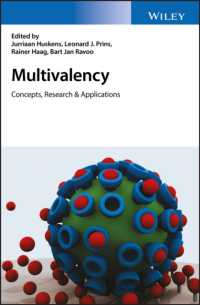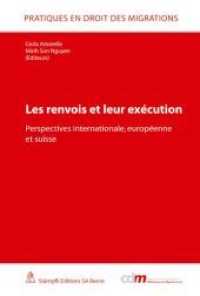- ホーム
- > 洋書
- > 英文書
- > Science / Mathematics
Full Description
First Published in 1989. We clearly know more today about teaching and learning mathematics than we did twenty years ago, and we are beginning to see the effects of this new knowledge at the classroom level. In particular, we can point to several significant sets of studies based on emerging theoretical frameworks. To establish such a framework, researchers must be provided with the opportunity to exchange and refine their ideas and viewpoints. Conferences held in Georgia and Wisconsin during the seventies serve as examples of the role such meetings can play in providing a vehicle for increased communication, synthesis, summary, and cross-disciplinary fertilization among researchers working within a specialized area of mathematical learning. This monograph holds selected papers from four more recent conferences on Research Agenda in Mathematics Education.
Contents
Contents: C. Kieran, S. Wagner, The Research Agenda Conference on Algebra: Background and Issues. Part I:Past Research and Current Issues.J.A. Thorpe, Algebra: What Should We Teach and How Should We Teach It? J.R. Leitzel, Critical Considerations for the Future of Algebra Instruction. C. Kieran, The Early Learning of Algebra: A Structural Perspective. L.R. Booth, A Question of Structure. N. Herscovics, Cognitive Obstacles Encountered in the Learning of Algebra. D. Tall, Different Cognitive Obstacles in a Technological Paradigm. S. Chaiklin, Cognitive Studies of Algebra Problem Solving and Learning. R.B. Davis, Three Ways of Improving Cognitive Studies in Algebra. J.H. Larkin, Robust Performance in Algebra: The Role of the Problem Representation. P.W. Thompson, Artificial Intelligence, Advanced Technology, and Learning and Teaching Algebra. M.W. Lewis, Intelligent Tutoring Systems: First Steps and Future Directions. J.J. Kaput, Linking Representations in the Symbol Systems of Algebra. D. Kirshner, Critical Issues in Current Representation System Theory. J.T. Fey, School Algebra for the Year 2000. S.L. Senk, Toward School Algebra in the Year 2000. Part II:A Research Agenda.S. Wagner, C. Kieran, An Agenda for Research on the Learning and Teaching of Algebra. L.R. Booth, The Research Agenda in Algebra: A Mathematics Education Perspective. M.W. Lewis, The Research Agenda in Algebra: A Cognitive Science Perspective. S.L. Rachlin, The Research Agenda in Algebra: A Curriculum Development Perspective. Part III:Theoretical Considerations.R.B. Davis, Research Studies in How Humans Think About Algebra. J.H. Larkin, Eight Reasons for Explicit Theories in Mathematics Education. D. Wheeler, Contexts for Research on the Teaching and Learning of Algebra.








